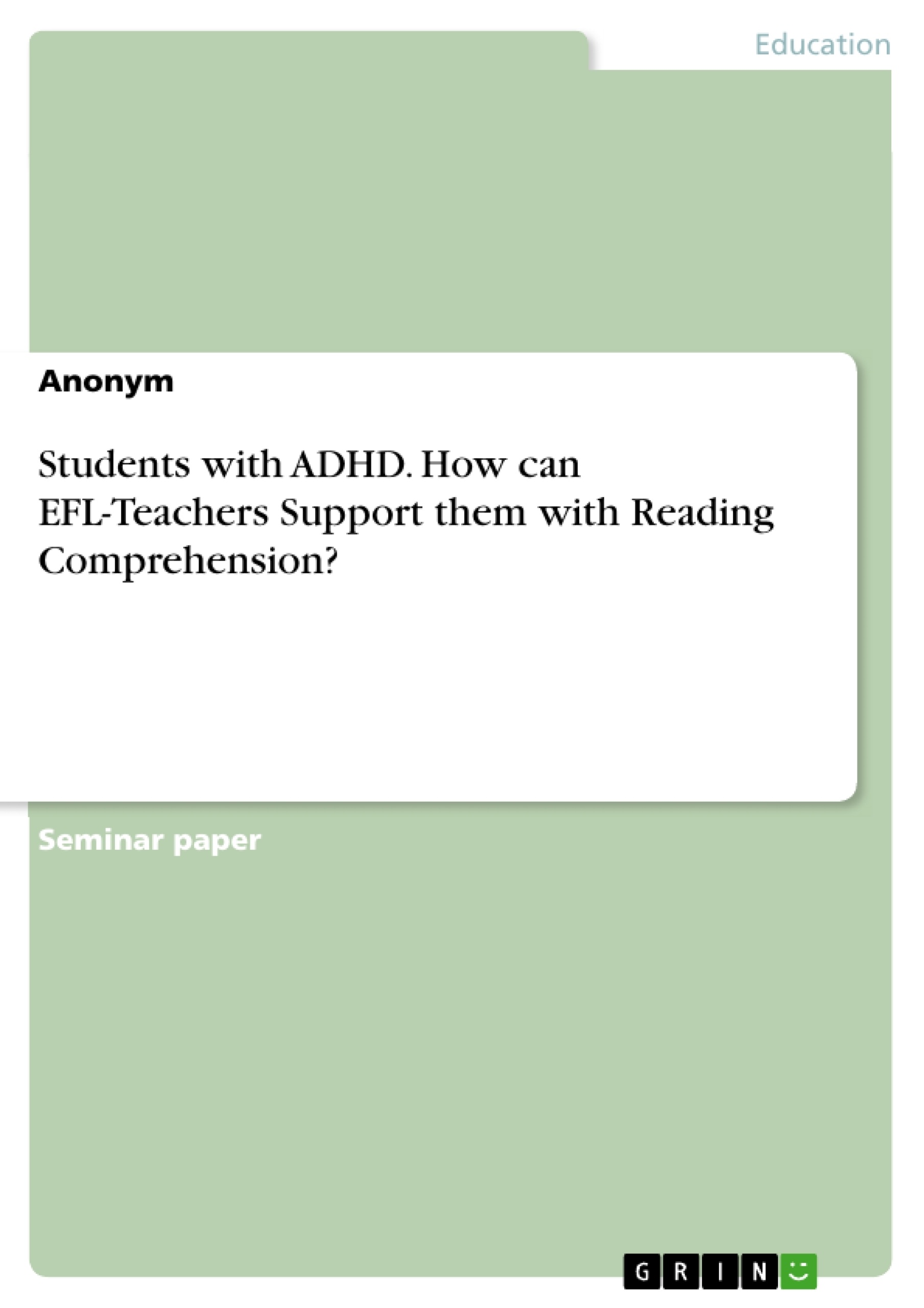This term paper deals with the question, how English as a foreign language teachers (in the following EFL-teachers) can support students with ADHD of a sixth class with reading comprehension. The focus while doing so will be on the state of knowledge of a sixth class of a Realschule in Lower Saxony.
Die Arbeit stellt die Schwierigkeiten dar, die Schüler*innen mit der Aufmerksamkeitsdefizit-/ Hyperaktivitätsstörung (ADHS) der sechsten Klasse im Englischunterricht (EFL) haben könnten (bezüglich des Leseverstehens) und erläutert daraufhin Möglichkeiten, wie die Schüler*innen in den Unterricht und dem Erwerben des Leseverstehens inkludiert werden können.
Table of Contents
- Introduction
- Definition: ADHD
- Definition: Reading Comprehension of a Sixth Class
- Curriculum
- Common European Framework of Reference for Languages (CEFR)
- Difficulties of Students with ADHD regarding Reading Comprehension
- Possibilities of EFL-Teachers to Support the Reading Comprehension of Students with ADHD
- Lessons
- Methods and Measures
- Behaviour and Role of the Teacher
- Conclusion
Objectives and Key Themes
This term paper investigates how English as a foreign language teachers (EFL-teachers) can effectively support students with ADHD in a sixth-grade class to improve their reading comprehension skills. The study focuses on the knowledge and skills of a typical sixth-grade class at a Realschule in Lower Saxony, considering the curriculum and the Common European Framework of Reference for Languages (CEFR).
- Defining and understanding the characteristics of ADHD
- Examining the specific challenges students with ADHD face in reading comprehension
- Exploring effective strategies EFL-teachers can implement to support reading comprehension among students with ADHD
- Analyzing the role of the teacher in creating a conducive learning environment for students with ADHD
- Highlighting the importance of individualized support and differentiated instruction in the EFL classroom
Chapter Summaries
- Introduction: The paper introduces the research topic by drawing a parallel between the fictional character Michel from Lönneberga and ADHD, highlighting the importance of providing support for students with ADHD in reading comprehension, particularly in foreign languages.
- Definition: ADHD: This chapter defines ADHD, outlining its key symptoms including inattentiveness, impulsivity, and hyperactivity. It also discusses the prevalence of ADHD in children and adolescents, the challenges it poses in school settings, and the importance of multimodal treatment approaches.
- Definition: Reading Comprehension of a Sixth Class: This chapter explores the concept of reading comprehension, distinguishing it from simple reading. It examines the requirements of the English curriculum for a sixth-grade class in Lower Saxony, considering the CEFR guidelines.
Keywords
This term paper delves into the challenges and strategies related to supporting students with Attention Deficit Hyperactivity Disorder (ADHD) in their reading comprehension development within an English as a Foreign Language (EFL) classroom. Key considerations include the curriculum, the Common European Framework of Reference for Languages (CEFR), effective teaching methods, and the specific needs of students with ADHD. The paper aims to provide valuable insights for EFL-teachers seeking to create an inclusive and supportive learning environment for all students.
Frequently Asked Questions
How does ADHD affect reading comprehension in English as a foreign language?
Students with ADHD may struggle with focus, processing long texts, and impulsivity, which can hinder their ability to understand complex narratives in a new language.
What are effective methods for EFL teachers to support ADHD students?
Teachers can use differentiated instruction, break texts into smaller segments, use visual aids, and implement clear, structured routines during lessons.
What role does the teacher's behavior play?
A supportive, patient, and structured teacher role is crucial for creating an inclusive environment where ADHD students feel safe and motivated.
What are the key symptoms of ADHD in a classroom setting?
The primary symptoms are inattentiveness, impulsivity, and hyperactivity, which often manifest as difficulty staying on task or following multi-step instructions.
How does the CEFR relate to reading comprehension for 6th graders?
The Common European Framework of Reference (CEFR) sets standards for what level of understanding (e.g., A2) students should reach, guiding teachers in selecting appropriate materials.
- Quote paper
- Anonym (Author), 2020, Students with ADHD. How can EFL-Teachers Support them with Reading Comprehension?, Munich, GRIN Verlag, https://www.grin.com/document/1214508



